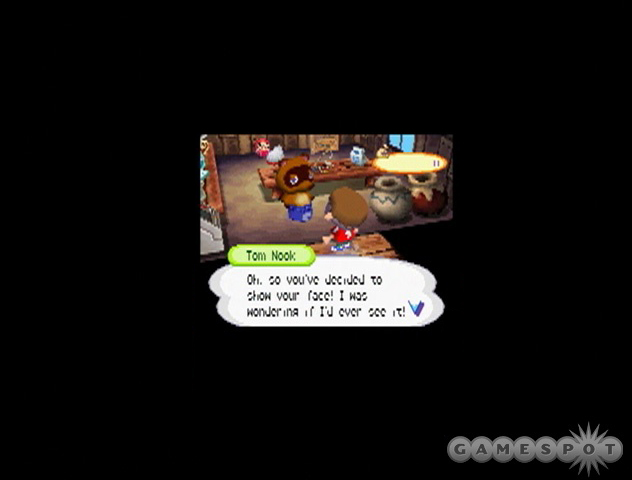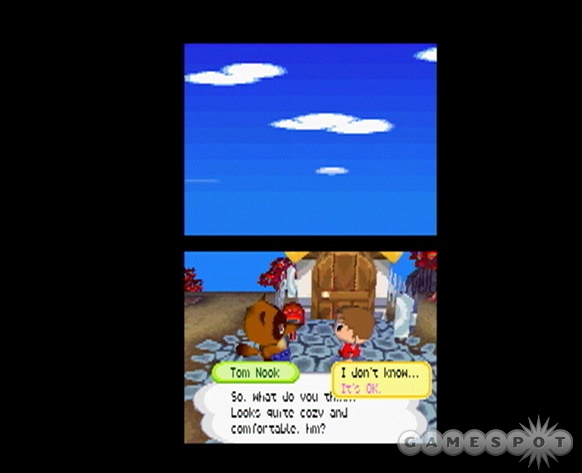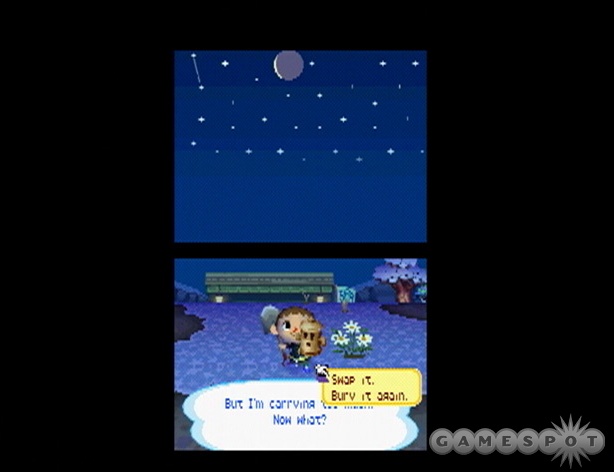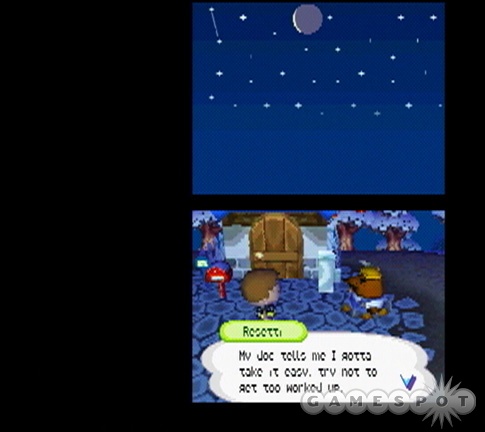Nintendo has made its reputation by creating fun, offbeat, family-friendly gaming experiences that are often considered innovative. But even the most stalwart Nintendo fans had to be a little confused the first time they got a look at Animal Crossing. The very definition of a nongame, Animal Crossing for the GameCube took gentle sprinklings of the role-playing and life-simulation genres and put them into a capriciously adorable world filled with cartoon animals--one that you would have to live and survive in by performing what would normally look like menial labor tasks. But as uneventful as it sounds on paper, Animal Crossing was easily one of the most inexplicably fetching gaming experiences to be had on the GameCube, and it was near impossible not to be taken in by the charms of its precocious animal residents and habitual collecting mechanics. Now, Nintendo has brought the insidiously addictive world of Animal Crossing to the DS in the form of Animal Crossing: Wild World. This isn't a sequel; rather, this is something of a reenvisioning of the last game, with a slew of new collectibles, new characters, new tasks to perform, and some Wi-Fi and online multiplayer functionality to boot. Granted, not every single one of these additions is a slam dunk, and in fact, a few things just aren't as good as they could have been; but Wild World ultimately surpasses the last game, simply because of how much better suited its style of gameplay is for a handheld system like the DS.

The premise of Wild World is identical to that of Animal Crossing. You, a young human, are moving to a new town. You begin this game inside the cab of a salty old fellow named Kapp'n (whom fans of the first game will certainly recognize). He quizzes you on a few different things, and how you answer those questions ultimately determines your gender as well as your appearance. Once in town, you meet up with the local shop keep, Tom Nook. This industrious little raccoon turns out to be the real estate magnate of your new town, and he puts you up in some new digs, despite your lack of funds. Of course, now you're indebted to him to the tune of several thousand bells (the game's form of currency), and it's up to you to pay him back, forthwith. Animal Crossing aficionados will find this setup to be quite familiar, as they will with the events that follow. The tasks and methods for making money generally are the same, with only a few additions here and there to break things up. That's not inherently a bad thing by any means--the system remains just as oddly compelling as it was on the GameCube.
Some of those tasks include catching fish and bugs, digging up fossils, and running errands for the local townsfolk. Fundamentally, all these things work the same as they did on the GameCube, relying on very little in the way of skill, save for the little bouts of reflexive action you'll need in the fish and bug catching. Changes are few and far between, though most of the ones made are for the better. Fossils, for instance, are much more easily identified here. Before, you'd have to send them via a letter to a far-off museum just to get them identified. Now you can simply hit up Blathers the Owl at the town museum, and he can identify them for you on the spot (he must've taken some kind of correspondence course between the first game and this one). When catching fish, you'll have to listen for a specific audio cue to pull in your line rather than relying on the rumbling of the controller to figure out when to pull back. But otherwise, everything works the same. Fish still appear as outlines in the water, letting you know where to drop your line; bugs still appear in their usual places, as do fossils. The difference is that there's just a lot more of all these things to catch and dig up, meaning you'll be spending even more of your free time trying to find that last piece to put together a Pterosaur's skeleton, or those last few rare fish you need for your collection.
There are new tasks to perform in Wild World, but frankly, they're just not as compelling as the holdover tasks from the original game. For example, you can use a watering can to maintain the floral arrangements scattered about town and a slingshot to knock occasional floating presents out of the sky. But these tasks aren't nearly as enthralling as anything else in the game. You don't need to use the slingshot, save for maybe once a day, and watering plants yields very little in the way of a tangible reward, save for the beautification of the town (which, while a valid goal, isn't the most monetarily rewarding task there is).

The thing of it is, however, that the pure mechanical busywork included in the Animal Crossing experience really isn't what makes it so appealing. These are merely means to one of several ends. The main end is the customization of your house and character. As you pay off your debt (and subsequent followup debts, from each major house renovation that comes over time), you'll find yourself in Tom Nook's shop time and time again, selling fruit and fish and bugs and any other bric-a-brac you can find to earn more bells to buy the insanely vast variety of furniture pieces, clothes, and other wacky items available. Want a big, spinning UFO to stick in the middle of your living room? Or a complete set of orange furniture? How about a complete series of man-size (or animal-size) chess pieces? It can all be yours--just not all at once. Only a few items are available each day, and the list changes with each passing day, thus inspiring you to check back constantly with the hope that that modern end table or rare painting you're missing is just a shop visit away. The only thing missing from the collectible items list in Wild World is the roster of classic NES games found in Animal Crossing. There are none to collect here, which is a little disappointing considering how cool it was to get those in the first game.
And that's really the beauty of Animal Crossing. This is very much the kind of game you'll want to check back with daily, simply because there's always something new to check out. Whether it's just the everyday business of shopping and collecting, or one of the many annual events that pop up, there's always something new to see. It's great, because the game uses the DS's internal clock to progress in real time. There are holidays that are based on real-life holidays, and they take place on the dates they're supposed to. Every Saturday, for instance, there's a town flea market in which you can go from house to house, buying other characters' furniture; that same night, the traveling musician K.K. Slider will come and perform, and will give you new music to play in your house. And then there will be periodic visits from characters who can provide you with rare and unique items, like the new traveling salesman who looks and talks like a cross between Gil from The Simpsons and Jack Lemmon's character from Glengarry Glen Ross as he shadily and desperately tries to sell you accident insurance, with hilarious results.
The characters are also a huge part of the game's appeal. Since this is basically just a "place to go and hang out" simulator, it wouldn't work if the characters you were hanging out with weren't fun to converse with. Your neighbors come in a wide variety of different animal and personality types. You might see repeats of certain personalities, but you won't often see much repetition in dialogue, because there's such a huge array of things that these characters will converse with you about, and almost all of it is sharp and funny. As time goes on, citizens will move on to other towns, and new ones will come in, which actually helps give the town an air of unpredictability. But there are also some staples that will always be there, like Tom Nook and Blathers, as well as a couple of newcomers, such as Celeste, who runs the observatory in the museum (and even lets you plot your own constellations in the sky), and Brewster, who runs the local coffee shop and provides you with piping-hot cups of joe that put big, silly grins on your character's face. Interacting with and working for all these different characters is quite a joy, and makes it worth coming back to time and time again.

Wild World also prevents itself from getting overly tiresome by regulating exactly how much you can play. You can always just go chat it up with the neighbors and do whatever tasks you feel like, but because there's only so much you can actually buy and so many things you can experience on a day-to-day basis, the game is really best played in short, controlled bursts. That was the case with the original Animal Crossing too, but there's something more to be said for this style of play on a handheld system like the DS. Being able to take your town with you wherever you go and play whenever you feel like it is just more appealing than trying to hunker down and check in via your GameCube every day.
But what if you've already played Animal Crossing to death on the GameCube? Apart from more items and new characters, what does Wild World really have to offer? For one, it does include a new touch-screen-based control system--albeit one that isn't as fleshed out as you might hope. You can use the touch screen to guide your character anywhere around the world or make them perform actions like casting a fishing line or digging a hole, and to make menu navigations and chatting a much easier task. Truthfully, the basic character controls are generally easier with the D pad and buttons. It's more of a pain than it needs to be to try to position your character in the right spot to cast a fishing line or dig a hole in the right spot, and you really do get a better handle with the D pad. When navigating menus, though, it's great to have this feature; it streamlines the process of picking items to sell to Tom Nook and writing letters immensely. It's just too bad that the screen wasn't utilized more effectively to make things like fishing an easier endeavor.
Wild World also includes a full range of multiplayer features. The single-cart, four-player methodology from the first game is here again, though the difference is that all four players now share the same house, and the same collective debt. If you just want to visit a friend's town, you can do so in close proximity via the standard DS-to-DS connection, or you can visit a friend far away via the online Wi-Fi connectivity. The basics for both connection types remain the same. A friend can visit your town, or vice versa. While there, you and said friend can chat with one another, and do all the different things one would do in their own town. The one odd thing is that while you're in a new town or have a visitor in yours, every town resident retreats indoors. It makes them easier to find and visit with, but it's still a little peculiar.
The whole online thing might sound like the most wicked-awesome thing you've ever heard of, but there are a lot of weird restrictions to the mode. For one, you can't just visit any town with an open gate. You have to know the specific friend code of the player's town that you want to travel to, and have it on your friend list before you can go anywhere. Obviously this circumvents the unpleasant issue of jerks coming in to your town, cutting down all your trees, and writing nasty messages on your bulletin boards, but still, it's kind of lame that you can't just see all the available online towns. In fact, the only degree of randomness to be found in the multiplayer is the tag mode. Here, you'll buy a message in a bottle from Tom Nook's shop, write a letter, and release it. If you happen to be in tag mode, and someone else comes within proximity to you while they're in tag mode, your message will wash up on the shores of their town and vice versa. Through this, you might trade some constellations and citizens, but that's about it. All told, it's pretty cool that you can now take Animal Crossing online--it's just a shame that the game doesn't give you more to do with it, like fulfilling some specific multiplayer objectives or tasks. And the fact that you can only play with people you communicate with outside the game seems overly restrictive.

Wild World presents itself in much the same fashion as the original Animal Crossing, and while those production values weren't exactly impressive on a system as powerful as the GameCube, on the DS's more modest hardware, the game looks great. The characters all retain the same colorful, cartoony look that they did in the first game, as does the town and its various architecture and scenery. The one big difference is how the town moves. The acre system from Animal Crossing is gone, and instead the world scales in sort of a rounded fashion, with sections disappearing over the horizon line as you move up and down the map. It looks a little weird at first, but you get used to it quickly. The only real sacrifices the game seems to have made to run on the DS hardware is that, first, it runs at a lower (but always consistent) frame rate, and second, things just don't look quite as crisp and sharp as they did on the GameCube. But again, there are different hardware specs, so that's to be expected. The audio still consists of some catchy, mellow MIDI tunes that play in the background and the cute, gibberish dialogue that the townspeople speak. You can't call any of it remarkable, exactly, but it's all pleasant and enjoyable stuff.
But really, with all of that said and done, the biggest reason you should play Animal Crossing: Wild World is because it's Animal Crossing done portable, and done well. You can certainly find fault with the lazy touch screen controls, the restrictiveness of the multiplayer, and the inherent sameness of the whole thing, but the fact remains that all the key underlying components that make this an Animal Crossing game are just as great as they've ever been, and being able to take your living, breathing town with you wherever you go is an absolute delight. If you weren't keen on the precious nature of the first game, Wild World won't do much to change your mind. But if you're one of the many who fell in love with the first game's unmistakable charms, Wild World is a world worth entering.